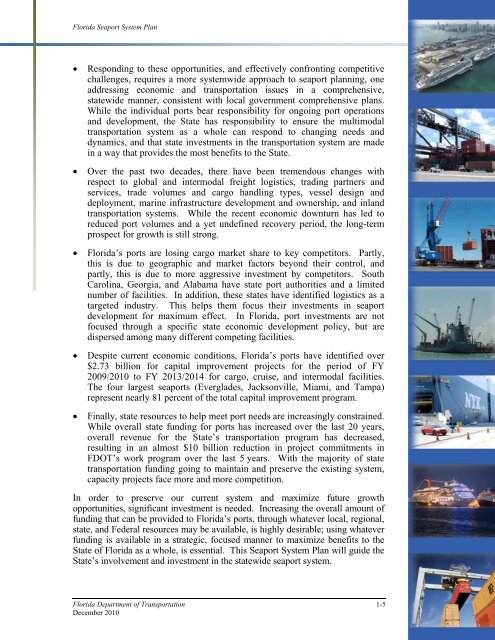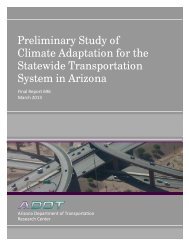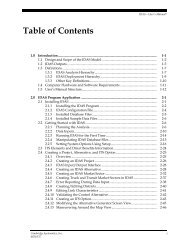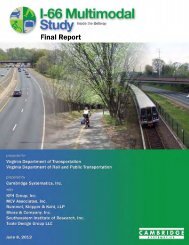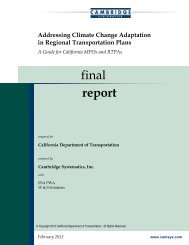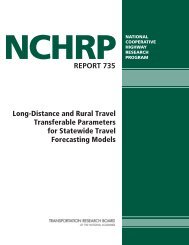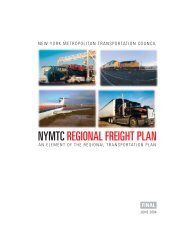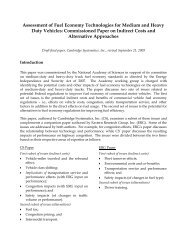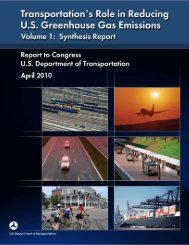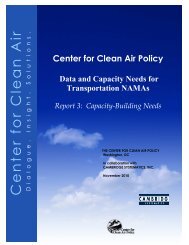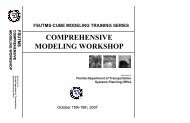Florida Seaport System Plan - SeaCIP
Florida Seaport System Plan - SeaCIP
Florida Seaport System Plan - SeaCIP
You also want an ePaper? Increase the reach of your titles
YUMPU automatically turns print PDFs into web optimized ePapers that Google loves.
<strong>Florida</strong> <strong>Seaport</strong> <strong>System</strong> <strong>Plan</strong><br />
• Responding to these opportunities, and effectively confronting competitive<br />
challenges, requires a more systemwide approach to seaport planning, one<br />
addressing economic and transportation issues in a comprehensive,<br />
statewide manner, consistent with local government comprehensive plans.<br />
While the individual ports bear responsibility for ongoing port operations<br />
and development, the State has responsibility to ensure the multimodal<br />
transportation system as a whole can respond to changing needs and<br />
dynamics, and that state investments in the transportation system are made<br />
in a way that provides the most benefits to the State.<br />
• Over the past two decades, there have been tremendous changes with<br />
respect to global and intermodal freight logistics, trading partners and<br />
services, trade volumes and cargo handling types, vessel design and<br />
deployment, marine infrastructure development and ownership, and inland<br />
transportation systems. While the recent economic downturn has led to<br />
reduced port volumes and a yet undefined recovery period, the long-term<br />
prospect for growth is still strong.<br />
• <strong>Florida</strong>’s ports are losing cargo market share to key competitors. Partly,<br />
this is due to geographic and market factors beyond their control, and<br />
partly, this is due to more aggressive investment by competitors. South<br />
Carolina, Georgia, and Alabama have state port authorities and a limited<br />
number of facilities. In addition, these states have identified logistics as a<br />
targeted industry. This helps them focus their investments in seaport<br />
development for maximum effect. In <strong>Florida</strong>, port investments are not<br />
focused through a specific state economic development policy, but are<br />
dispersed among many different competing facilities.<br />
• Despite current economic conditions, <strong>Florida</strong>’s ports have identified over<br />
$2.73 billion for capital improvement projects for the period of FY<br />
2009/2010 to FY 2013/2014 for cargo, cruise, and intermodal facilities.<br />
The four largest seaports (Everglades, Jacksonville, Miami, and Tampa)<br />
represent nearly 81 percent of the total capital improvement program.<br />
• Finally, state resources to help meet port needs are increasingly constrained.<br />
While overall state funding for ports has increased over the last 20 years,<br />
overall revenue for the State’s transportation program has decreased,<br />
resulting in an almost $10 billion reduction in project commitments in<br />
FDOT’s work program over the last 5 years. With the majority of state<br />
transportation funding going to maintain and preserve the existing system,<br />
capacity projects face more and more competition.<br />
In order to preserve our current system and maximize future growth<br />
opportunities, significant investment is needed. Increasing the overall amount of<br />
funding that can be provided to <strong>Florida</strong>’s ports, through whatever local, regional,<br />
state, and Federal resources may be available, is highly desirable; using whatever<br />
funding is available in a strategic, focused manner to maximize benefits to the<br />
State of <strong>Florida</strong> as a whole, is essential. This <strong>Seaport</strong> <strong>System</strong> <strong>Plan</strong> will guide the<br />
State’s involvement and investment in the statewide seaport system.<br />
<strong>Florida</strong> Department of Transportation 1-5<br />
December 2010


